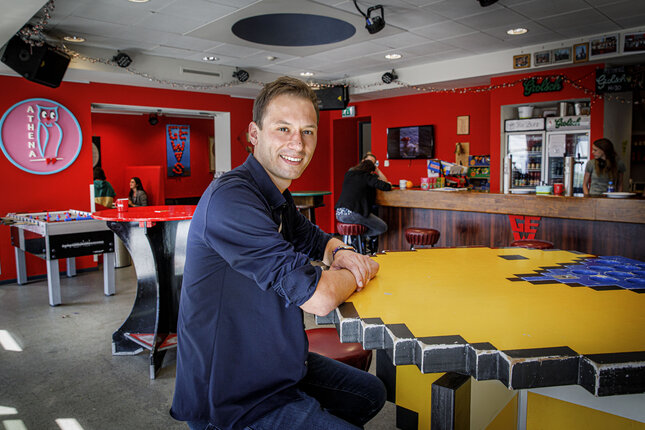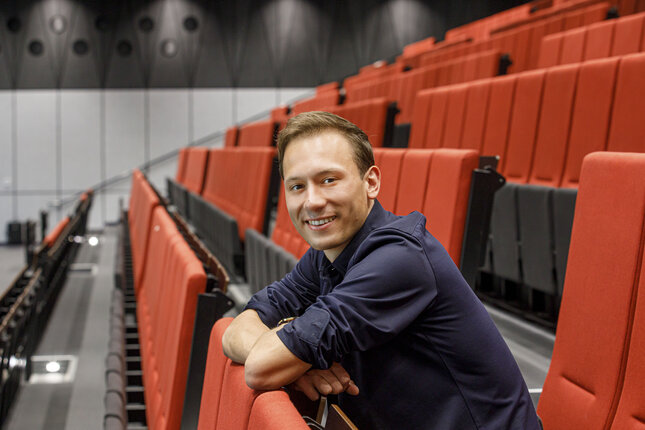'This course helps student board members get more out of their board year'
New bachelor’s elective on student boards focuses on cooperation, conflict resolution, and leadership.

How many TU/e students can say they have their own course? Ralph van Ierland can. He co-founded a new bachelor elective for student boards that will start in September - and earn students 5 ECTS. “This is fantastic. I hope it helps many students gain more from their board year,” he says.
When Ralph was the External Relations Commissioner at the GEWIS study association, his fellow board members regularly dragged him out from behind his computer in the evenings. ‘Come, Ralph, time for a beer. That’s enough for today.’
“I worked long hours, something I saw others doing too. But I lacked a reference point: why am I doing it? I loved it, but I hadn’t set any concrete goals about what I wanted to get out of my term and hadn’t determined where my limits lay.”
Van Ierland, now an Applied Mathematics Master’s student, continues: “Most student board members don’t take enough time to consider that. They just keep slogging along, bumping into the same problems previous boards have encountered before them. I’ve seen many association board members drop out due to burnout. That’s crazy, especially at our age. I hope our Successfully managing your board year course can help student board members get a handle on the rest of their term.”

“It’s often only once you reach the end of your board year that you discover there was an easier way to do things. This elective will teach you, evidence-based, how to govern more effectively. Of course, it’s a fantastic experience to do a board year. You do it because you care about your association, but putting yourself first is also important. This course will give you the necessary knowledge about leadership, dealing with conflicts, motivating volunteers, and diversity and inclusiveness within your board. You also learn to negotiate when talking to companies.”
The plan
It has been a while since Van Ierland has served on the GEWIS board, and he wishes he had a course like this to follow back then. A few years later, he was a University Council member for the Group One student. There, he and fellow group member Anne Jenster (Industrial Design student) came up with the plan to make this course a reality.
They sent a survey to board members from different associations across different year levels and received 207 responses. “It showed that most of them would consider taking a course on governance,” says Van Ireland.
Thinking you would like a new course and asking the target group what they need is one thing. Designing a course is an entirely different matter. They were happy to leave the theory and subject knowledge to the Department of Industrial Engineering and Innovation Sciences lecturers. “Eva Demerouti and Sonja Rispens of the Human Performance Management group were immediately on board. They brainstormed with us from the very start, introduced the theory into the course, and made it a cohesive whole so that it’s also worth those five credits,” says Van Ierland.
If I’d followed this course in my board year, I could’ve tackled many problems before they arose
Ralph van Ierland, Applied Mathematics Master’s student and initiator of the board elective
“Education and Student Affairs offers training to prepare you for your board year. Our elective, however, delves far deeper and more extensively into the theory around, for example, leadership and how to apply it. Boards are judged if they do something poorly. That’s why it’s important to communicate clearly why things work or don’t. And that you make good deliberations together. That isn’t easy, especially if you have a long to-do list. If I could’ve taken this course, I’d have recognized similar situations much earlier and would’ve been able to tackle them.”
Student boards have several major pitfalls. These formed the groundwork for the elective, says Van Ierland.
Not taking a break: “You often don’t dare take a break. It’s a case of FOMO and feeling pressure to perform well as a board. That leads to you overworking yourself.” The elective therefore focuses a lot on time management, working together, working on goals, and personal leadership.
Motivating volunteers: “This is more a challenge than a pitfall, but it’s so important. Boards need to manage, not do everything themselves. You have to learn to delegate. How do you get your volunteers to do what is needed? They have other considerations than board members, who’ve chosen to put their studies on hold for a year to perform this task. Your volunteers are full-time students with a different rhythm than you. It’s vital to keep these volunteers committed to your association; they’re often the future board members. This course will teach you about leadership; how to motivate others and yourself.”
Diversity and inclusivity: “Internationalization permeates the entire campus. And many clubs are developing policies on this. How do you involve internationals in your board? How do you make your association inclusive? When I was on my association’s board, we thought it was important to be more international. Then we sat down to discuss this with 20 Dutch people,” Van Ierland says, smiling at the memory. “You have to work in an evidence-based manner, not rely on your gut. The elective provides the theory behind this; you can learn a lot from that.”

Looking ahead
Van Ierland hopes this elective will soon fill up with enthusiastic future board members of the nearly 200 associations that exist at TU/e. “It would be amazing if, in a few years, this course is brimming with 300 students. And that, should I return to the TU/e campus in ten years, it will still be taught.”
Does this course sound like something for you?
Will you be serving as a board member for one of the TU/e’s associations or student teams, for a minimum of eight hours a week, in the coming year? Then you can register for the bachelor elective Successfully managing your board year (1JK30) via Osiris Student. The course will run over quartiles 1 and 2, and you will get 5 ECTS. You will be graded based on a group assignment (50%), individual assignment (30%), and active participation during the course (20%). Registration opened on June 15, and there is room for up to 50 students.
More on our strategy


![[Translate to English:] [Translate to English:]](https://assets.w3.tue.nl/w/fileadmin/_processed_/c/f/csm_BvOF_2024_0319_AEV_license_TUe_Dirk_van_Meer_-_CORE_1__c976e259a5.jpg)

